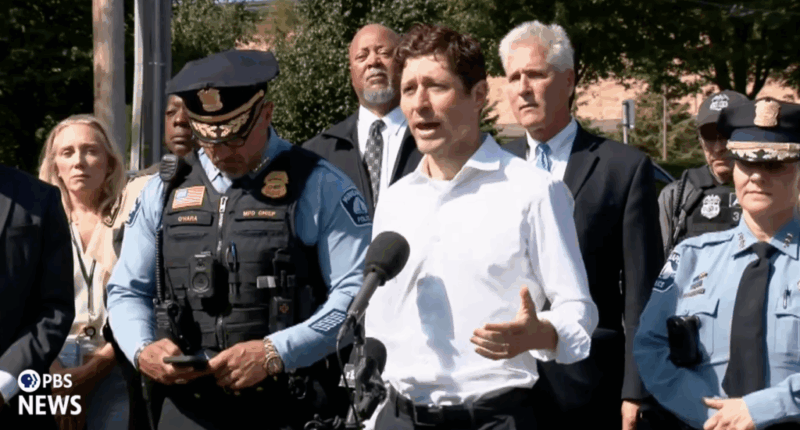Hours after a young man who appeared to identify as a woman and to hate Christians opened fire on Catholic primary school students at Mass on Wednesday, leftist Twitter had identified a culprit: prayer.
“Prayer is not freaking enough. Prayers does not end school shootings,” wrote Jen Psaki, former White House press secretary and an MSNBC host. “Prayer does not bring these kids back. Enough with the thoughts and prayers.”
“Don’t just say this is about thoughts and prayers right now. These kids were literally praying,” lectured Minneapolis Mayor Jacob Frey.
“Forget about thoughts and prayers,” echoed CNN host Dana Bash, describing Frey’s position as one “most people feel.”
Manuel Oliver, whose own son was killed in a school shooting in Parkland, Fla., went on CNN to say “thoughts and prayers this time are out of the picture. I mean, these kids were actually praying … the God they were all praying to, and still they were shot.”
The implied argument is, if prayer didn’t protect these young Christians from being killed, it must be useless or at least insufficient. There’s a transactional undercurrent to these protestations: that these children placed their faith in God and He failed to hold up His end of the bargain.
Every Christian who has ever experienced suffering has wrestled with the question of why God does not prevent every tragedy. I’m sure the parents, siblings, grandparents, and friends of the victims are grasping for answers to those questions now.
But it’s quite another thing to mock and belittle the prayers offered by students at the Annunciation Catholic School this morning, or the prayers offered by loved ones and strangers mourning the tragedy. Such mockery betrays an arrogant misunderstanding about not just the power but the purpose of prayer.
The primary purpose of prayer is not to have your desires, however good they may be, granted. If it were, God could simply provide the material answers to all your wants; He has no need for you to ask. Rather, prayer exists to sanctify us, to give us tangible opportunities to have our faith strengthened, to give us a deep and personal knowledge of God and His love for us, to conform us to His likeness, to remind us of our reliance on Him, and to bring Him glory. Oswald Chambers described prayer as “the way that the life of God in us is nourished.” Its purpose, he wrote, was not “getting things for ourselves” but “that we may get to know God Himself.”
To reject prayer because it is not answered in the way you hope is to take too small a view of prayer. Christ Himself prayed for outcomes that sovereign God declined to grant.
“Father, if you are willing, remove this cup from me,” Jesus prayed shortly before His arrest and crucifixion. “Nevertheless, not my will, but yours, be done.”
The Gospel of Luke adds this: “there appeared to him an angel from heaven, strengthening him.”
Sometimes God does not answer prayer by providing the specific solutions the beseeching Christian deems desirable, but by “strengthening him.” Or, as Chambers put it: “To say that ‘prayer changes things’ is not as close to the truth as saying, ‘Prayer changes me.’” Certainly, the children praying at school on Wednesday morning did not believe their prayers would insulate them from every earthly harm, as my former colleague Emily Jashinsky pointed out.
Those manipulating Wednesday’s tragedy to mock the earnest prayers of Christians reveal their own ignorance and selfishness. At its most charitable interpretation, their ridicule admits a transactional view of God, one in which they take it upon themselves to decide whether His provisions are sufficient. At worst, it echoes the mockery of the crowds who looked upon the crucified Christ and dared Him to save Himself. Like Wednesday’s scoffers, they observed an unanswered prayer and mocked what they perceived as a lack of God’s power:
…those who passed by derided him, wagging their heads 40 and saying, “You who would destroy the temple and rebuild it in three days, save yourself! If you are the Son of God, come down from the cross.” 41 So also the chief priests, with the scribes and elders, mocked him, saying, 42 “He saved others; he cannot save himself. He is the King of Israel; let him come down now from the cross, and we will believe in him. 43 He trusts in God; let God deliver him now…”
Contrast that reaction with that of the Canaanite woman in Matthew 15, which Charles Spurgeon used as the basis of an 1861 sermon on prayer. She begged Jesus to heal her daughter, Matthew writes, “but He answered her not a word.” Rather than take offense at His silence, Spurgeon observes, she continued to kneel before Him.
If you know the story, you know Jesus was eventually moved by her faith and granted her request. But Spurgeon used His initial non-answer to encourage Christians who feel their prayers have been ignored, reminding them that Christ has already proven His love and compassion.
“How canst thou think so wickedly of him as to suppose that he, who once died, the Just for the unjust, now that he lives again, has an adamantine heart, and no bowels of compassion?” he asked.
For Christians, including those who lost loved ones on Wednesday, the compassionate mercy of God can provide this comfort, even in the face of unimaginable loss. Those twisting Wednesday’s tragedy to mock God, on the other hand, should swiftly repent. For them, another exhortation of Spurgeon’s is appropriate:
Oh, that some here who never prayed would begin at once! Trust in Jesus, the Intercessor, and let that trust show itself by pleading the merit of his blood in earnest prayer. Oh, that you would now begin that holy life of prayer which shall lead up to the eternal life of praise at the right hand of God.
Elle Purnell is the assignment editor at The Federalist. She has appeared on Fox Business and Newsmax, and her work has been featured by RealClearPolitics, the Tampa Bay Times, and the Independent Women’s Forum. She received her B.A. in government with a minor in journalism. Follow her on Twitter @_ellepurnell.







